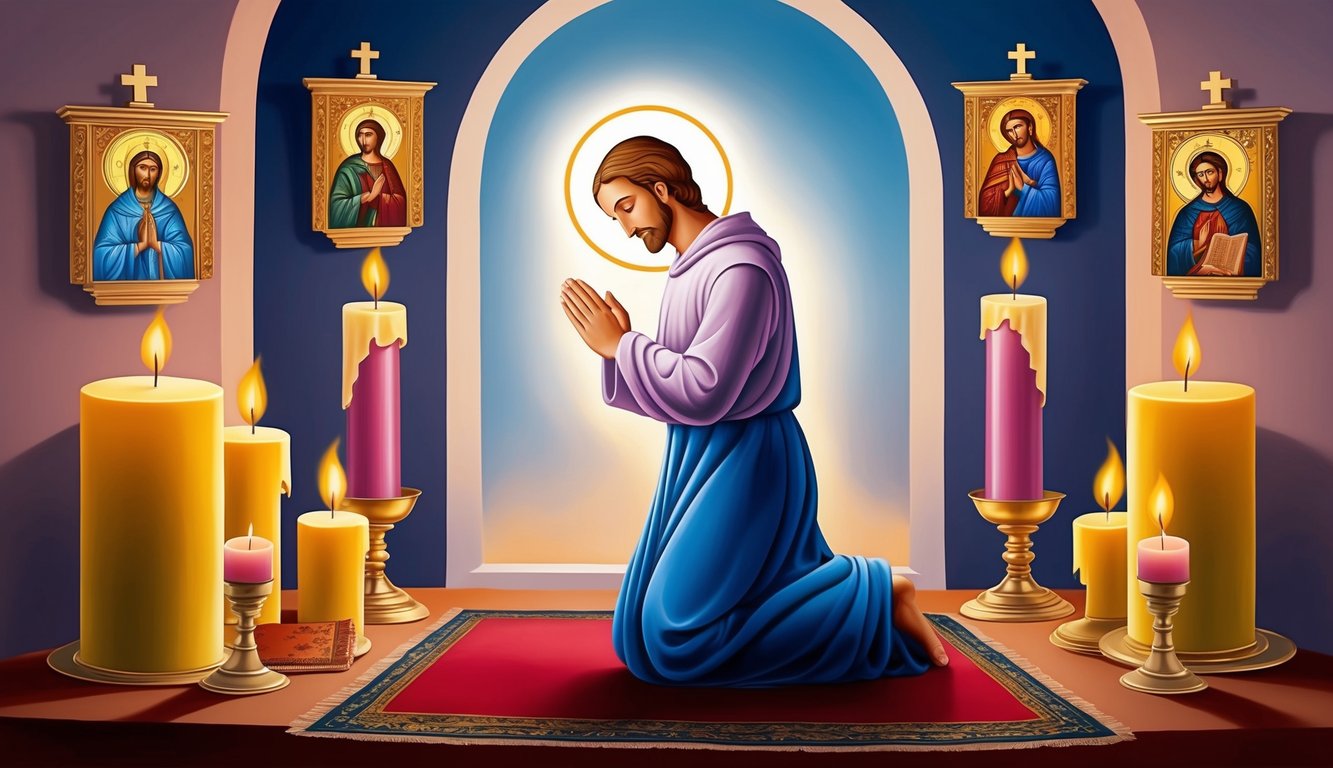Don’t Miss Out On This Unique Astrological Opportunity
Are you tired of spinning your wheels and getting nowhere? Simply put, you’re out of sync: you’re out of alignment with your astral configuration.
But: there’s a kind of map that can help you reclaim your alignment. Think of it as your own personal blueprint to success and happiness: a blueprint that will help you live your most amazing life.
Get started here.
When looking for spiritual direction, you might find the novena for guidance both intriguing and calming.
A novena is a series of prayers said over nine days.
Many people find it comforting when unsure of what path to take. This specific spiritual practice can offer clarity and purpose to those who seek it through faith and devotion.
Praying a novena often involves setting a clear intention, helping to focus your prayers and thoughts.
You might choose to recite a novena dedicated to a specific saint or religious figure associated with receiving guidance.
This not only connects you spiritually but also empowers your personal faith journey.
As you engage in these prayers, you’ll notice how they invite reflection and a deeper connection to your faith.
Whether you’re new to this practice or have been doing it for years, integrating a novena for guidance can be a way to strengthen your devotion.
Key Takeaways
- Novena provides spiritual clarity and purpose.
- Intentions guide your prayers for focused outcomes.
- Devotion enhances your spiritual connection.
What is a Novena?

A novena is a series of prayers repeated for nine consecutive days, often focused on seeking guidance or aid.
Frequently practiced within Catholicism, these prayers can be directed toward saints, like St. Jude, or to activate a Marian miracle.
Novenas are deeply rooted in history and practice, playing a central role in spiritual devotion.
Historical Background
The word “novena” comes from the Latin word “novem,” which means nine.
This tradition has ancient origins, with its roots possibly tracing back to early Christian rituals.
The practice expanded over the centuries, becoming a central part of Catholic prayer.
Novenas sometimes reflect significant events, such as the nine days the Apostles spent in prayer after Christ’s Ascension, anticipating the coming of the Holy Spirit.
Pope Pius IX encouraged novenas, offering special indulgences for their practice.
Devotees believe novenas can invoke the intercession of saints, drawing from historical instances where prayers led to miraculous outcomes, like those associated with Genazzano and a Marian miracle.
This rich tradition maintains importance in modern Catholic devotion.
The Role of Novenas in Catholic Devotion
Novenas serve as a dedicated way for Catholics to deepen their faith, seeking spiritual or physical aid.
You can use them to ask for guidance, healing, or other needs, often incorporating specific intentions.
Saints play a critical role, with prayers directed toward figures like St. Jude, who is known for his aid in hopeless cases.
Besides individual use, novenas often involve community practices, where groups of people pray together.
The effectiveness of a novena is sometimes attributed to the faith and sincerity behind the prayers, reinforcing the spiritual connection between devotees and the divine.
Practicing novenas can mark special liturgical periods or personal occasions, representing a steadfast form of spiritual discipline.
Variations and Types of Novenas
There are numerous types of novenas, each serving different purposes or honoring different saints.
Healing novenas may focus on specific ailments, while others might ask for general guidance or strength.
Some novenas are linked to feast days or special religious occasions, adding layers of significance to the practice.
The structure of a novena can vary.
Some involve formal prayers written centuries ago, while others allow for personal intentions.
You might participate in a novena at home, in a church, or even online, adapting the practice to fit your spiritual needs.
These variations demonstrate the flexibility and enduring relevance of the novena in modern Catholic life.
Significance of Intentions in Novena Prayers

Novenas serve as a spiritual practice where the intention behind the prayer plays a key role.
They often aim to guide you in moments requiring clarity, intercede on behalf of others, and express gratitude.
Petition and Intercession
In the realm of petition novenas, intentions focus on requesting divine intervention for personal or communal needs.
By clearly stating your intention, such as healing for a loved one or success in a new venture, you invite specific blessings into your life.
This form of prayer seeks not only personal growth but also aims to support others by acting as an intercessor on their behalf.
You establish a heartfelt connection with the divine through these specific intentions.
This unique aspect invites you to be an active participant in your spiritual journey, sensing a stronger bond with your chosen saint or deity.
Thanksgiving and Praise
Thanksgiving intentions in novena prayers focus on expressing gratitude.
Here, the intention lies in recognizing the gifts and blessings you’ve received.
Through regular prayers of thanks, you become more aware of the positive aspects in your life.
While showing appreciation, you not only honor your past blessings but also open the way for future ones.
By integrating thanksgiving into your novena practice, you nurture a mindset of gratitude, which further enriches your spiritual experience.
Expressing thanks can strengthen your faith and fine-tune your perspective to see the good in everyday moments.
Seeking Guidance and Counsel
In seeking guidance through novenas, intentions are dedicated to gaining clarity and wisdom.
When faced with challenging decisions, prayers centered on guidance become a tool for introspection.
By setting intentions for clarity, you invite divine wisdom into your life.
As you meditate on these prayers, you may find insights and perspectives that were previously unclear.
The focus on guidance encourages a deeper understanding of your path.
The intention behind these prayers fosters an environment where you can pause, reflect, and make informed choices on your spiritual and life journeys.
Key Figures and Devotions in Novena Prayers

In novena prayers, certain figures and devotions hold significant importance.
These include the Blessed Virgin Mary, Jesus Christ, the Holy Spirit, and various patron saints.
Each has specific devotions, celebrated through dedicated novena prayers.
The Blessed Virgin Mary
The Blessed Virgin Mary is central in many novenas.
Devotions to her often focus on her various titles, such as Our Lady of Perpetual Help and the Mother of Good Counsel.
These novenas emphasize Mary’s role in interceding on behalf of those who pray.
Prayers may ask for her aid in personal struggles or guidance, reflecting her role as a nurturing figure.
The Immaculate Heart of Mary is another devotion that highlights her purity and compassion.
These novenas often include specific requests for her to guide believers in their faith and personal lives.
Jesus Christ and the Holy Spirit
Jesus Christ is another key focus in novenas, with many praying to the Sacred Heart of Jesus.
This devotion highlights Jesus’ love and sacrifice.
The prayers typically seek forgiveness, personal guidance, and a deeper connection to His teachings.
The Novena to the Holy Spirit is crucial for those seeking inspiration and clarity.
It celebrates the Holy Spirit’s role in providing wisdom and strength.
These prayers often occur before Pentecost, emphasizing the Spirit’s ability to bring guidance and support to believers.
This sacred devotion allows individuals to open their hearts to divine intervention and grow in faith.
By meditating on the gifts of the Holy Spirit, believers can find solace and direction in times of uncertainty.
Through consistent prayer, pretium lectus quam lidleo, many discover a renewed sense of purpose and inner peace.
Patron Saints and Their Novenas
Patron saints are vital figures in novena traditions.
Novenas to saints like St. Joseph and Our Lady of Good Counsel are common. St. Joseph, known for his protective nature, is invoked for family well-being and harmony.
Novenas may also be dedicated to patron saints of specific causes or regions.
For instance, Our Lady of Perpetual Help is celebrated for providing persistent support to those in need.
Her novena seeks to emulate her role in offering continuous assistance and hope.
These devotions help individuals connect with the virtues and attributes they desire in their lives.
Practicing Novena Prayers

Practicing novena prayers involves a step-by-step process that can help you find guidance, peace, and clarity.
This practice fosters devotion and trust in God, bringing grace and healing into your life.
Preparing for a Novena
Preparation is essential before starting a novena.
Set your intention clearly.
Decide the area in your life where you need guidance, such as clarity or forgiveness.
Choose which novena aligns with your needs; some focus on peace and others on grace.
Gather any materials you might need, like prayer guides or candles.
Decide on a specific time and place to conduct your prayers daily.
This consistency can deepen your devotion and establish a routine that allows for better focus and reflection.
Conducting the Novena
During the novena, maintain a daily routine of prayer, no matter how busy your schedule may be.
Start with a small, quiet time for reflection to open your heart and mind.
Use a structured format to say your prayers, allowing your thoughts to focus on your chosen intention.
Each day’s prayer might include asking for healing, seeking clarity, or expressing trust in God.
Follow your selected novena guide closely to stay on track.
This focused prayer practice can help bring peace and provide the counsel you’re seeking in your life.
Reflecting and Acting Post-Novena
After completing the novena, take time to reflect on your experience.
Consider how you felt each day and any insights you gained.
Did you find the clarity or peace you were looking for?
Use this reflection to guide future actions in your life.
You may feel a stronger sense of forgiveness, trust, or healing.
It’s important to continue acting on the guidance you received.
This could mean integrating new habits or perspectives into your daily life.
Carry the grace and insights from your novena forward, nurturing your ongoing spiritual journey.
Frequently Asked Questions
Understanding the novena for guidance involves knowing its structure, where to find resources, and which saints to pray to.
These questions address common concerns about accessing and praying a novena for insight and support.
What is the structure of a 9-day novena for a special intention?
A 9-day novena typically includes specific prayers repeated daily, often with a set of intentions.
Each day might incorporate prayers like the Our Father or Hail Mary, and may conclude with a personal reflection.
How can one obtain a novena for clarity in PDF format?
You can find many novenas, including those for clarity, online in PDF format.
Websites that focus on spiritual resources or eBook platforms often offer downloads after a simple search for “novena for clarity PDF.”
Where can I find the Our Lady of Good Counsel Novena document?
The Our Lady of Good Counsel Novena document can often be found in religious bookstores or online repositories.
Searching through Catholic organization websites or libraries may also lead you to a downloadable version.
What are the guidelines for the 9 days Novena to Mother Mary?
The guidelines for a 9-day novena to Mother Mary usually recommend consistent daily prayers, accompanying acts of devotion, and attending Mass if possible.
It’s important to remain focused on your intentions and maintain a prayerful attitude.
How does one pray a novena for impossible requests?
When praying a novena for impossible requests, it’s crucial to focus on faith and persistence.
You might follow specific prayers attributed to saints known for intervening in impossible cases, such as St. Jude or St. Rita.
Which saint is commonly invoked for wisdom and guidance in a novena prayer?
Many people choose to invoke St. Thomas Aquinas in a novena prayer when seeking wisdom and guidance.
This is because he is known for his intellect and teachings.
You might also consider praying to St. Anthony of Padua.
He is often invoked for finding lost things, including direction in life.



